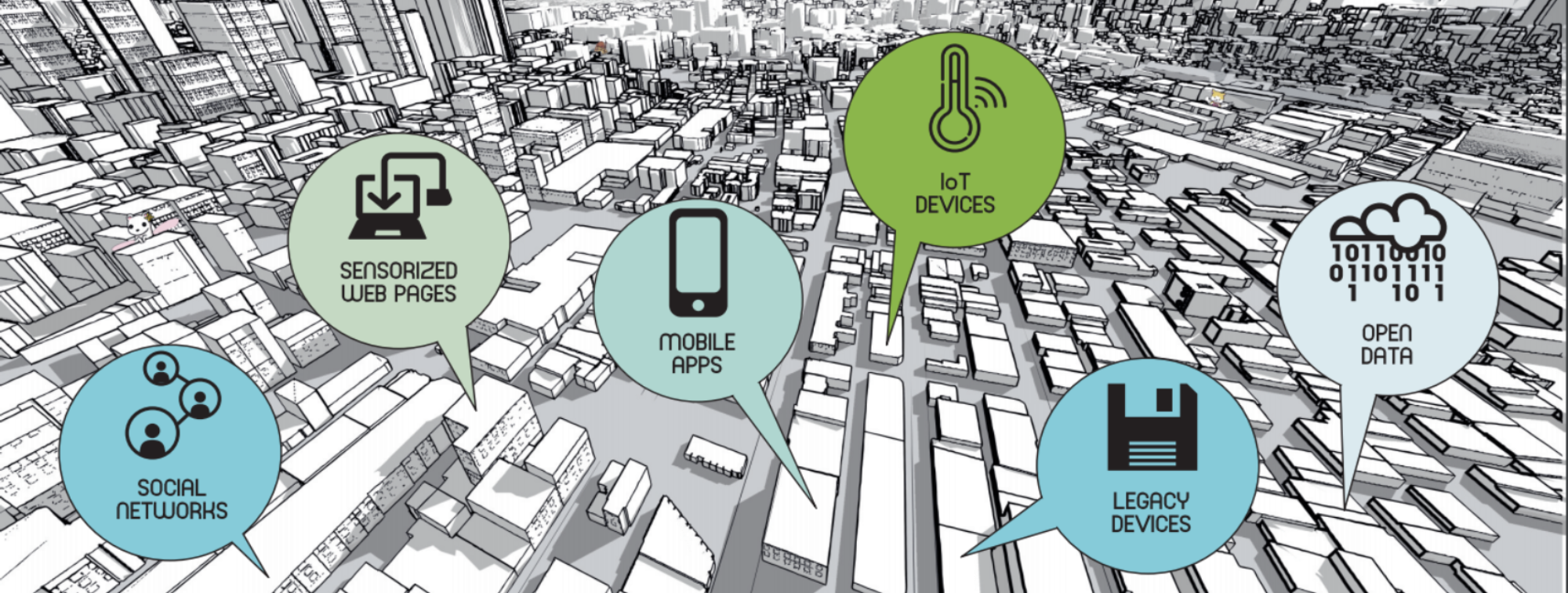Big data meeting Cloud and IoT for empowering the citizen clout in smart cities
PROJECT
BigClouT project uses today’s three key technological enablers: Internet of Things (IoT), cloud computing and big data, for the objective of increasing the efficiency in using urban infrastructure, economic and natural resources shared by the increasing population. BigClouT offers an analytic mind to the city by creating distributed intelligence that can be implanted throughout the whole city network either for large or smaller urban areas.
CUSTOMER

The BigClouT project is jointly funded by the European Union’s Horizon 2020 research and innovation program and by the Commissioned Research of National Institute of Information and Communications Technology (NICT), JAPAN. It involved for three years (2016-2019) eleven international companies and public authorities: NTT, CEA, Tsukuba university, Lancaster university, ICCS Greece, Keio university, NII, Absiskey cp, Grenobles-alps Metropole, Bristolisopen limited, Tsukuba city, Fujisawa city and Engineering Group.
OBJECTIVES
Build an interoperable architecture enabling data-driven IoT applications
Enable self-awareness in smart city platform with programmability and dependability properties
Provide libraries and tools for scalable knowledge extraction from distributed information sources in urban areas
Design and assess, with citizens and end-user involvement, attractive smart city services and applications
Create an ecosystem of innovators (SMEs, startups, citizens, etc.) with realistic win-win business models
THE NEED
ICT solutions have the potential to change the world and improve the quality of life of its citizens; in particular, IoT, cloud and big data are key enablers for increasing the efficiency in using shared urban infrastructure, economic and natural resources. The unprecedented number of connected things and the associated big data naturally raise new technical challenges in terms of interoperability, scalable and online data processing, actionable knowledge extraction, self-management, security and privacy. BigClouT leverages the results of the EU-Japan ClouT project and bring them several steps further and add, in particular, distributed intelligence with edge computing principles, big data analytics capability and self-awareness property.
THE ROLE OF KNOWAGE IN BIGCLOUT
KNOWAGE provided part of the following functionalities of the components:
· BIG DATA ANALYSIS, where processing in the cloud takes place on large quantity of data applying functions such as aggregation on static or streaming data and providing results either in batches or in a continuous manner
· DATA VISUALIZATION, where characteristics such as easiness of use, interoperability of heterogeneous data sources and extensibility are essential for quickly gaining understandings of the situations in city environments.
In particular, thanks to functionalities offered by KNOWAGE it has been possible to develop different interactive dashboards in various domains, such as, air pollution monitoring, road damage monitoring, energy consumption monitoring, etc..
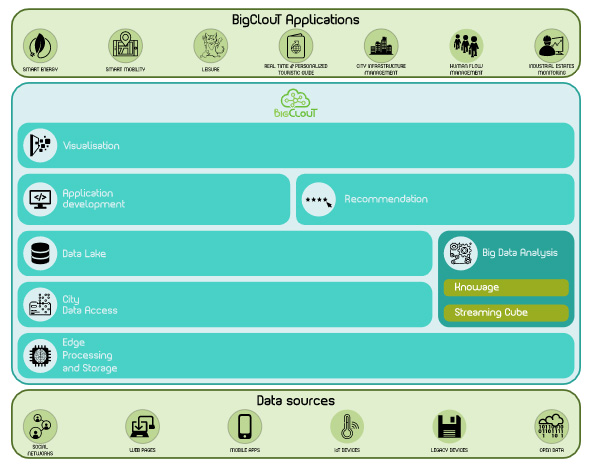
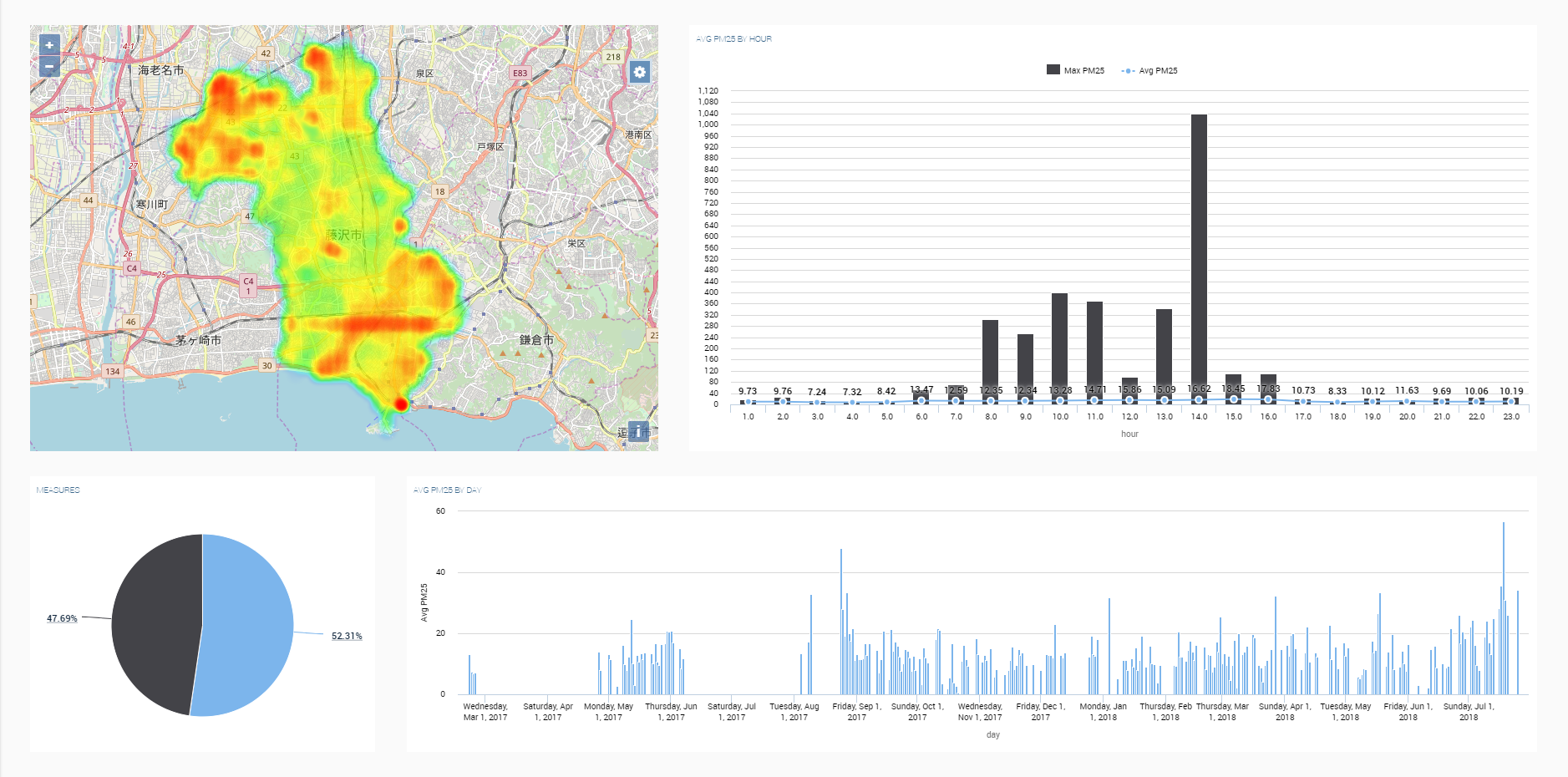
For example, KNOWAGE has been used to analyse pollution data and provide useful analysis and dashboards. The rationale behind this dashboard is to give insights about PM2.5’s trend within a specific time interval.
Each widget shows the average PM2.5 values obtained by performing different aggregation methods to the punctual measurements given as input from the source files.
Another analysis realized with KNOWAGE is the one on road damage data, performed through the aggregation and classification of the punctual measure by their geographical localisation and reported damage at different levels of details.

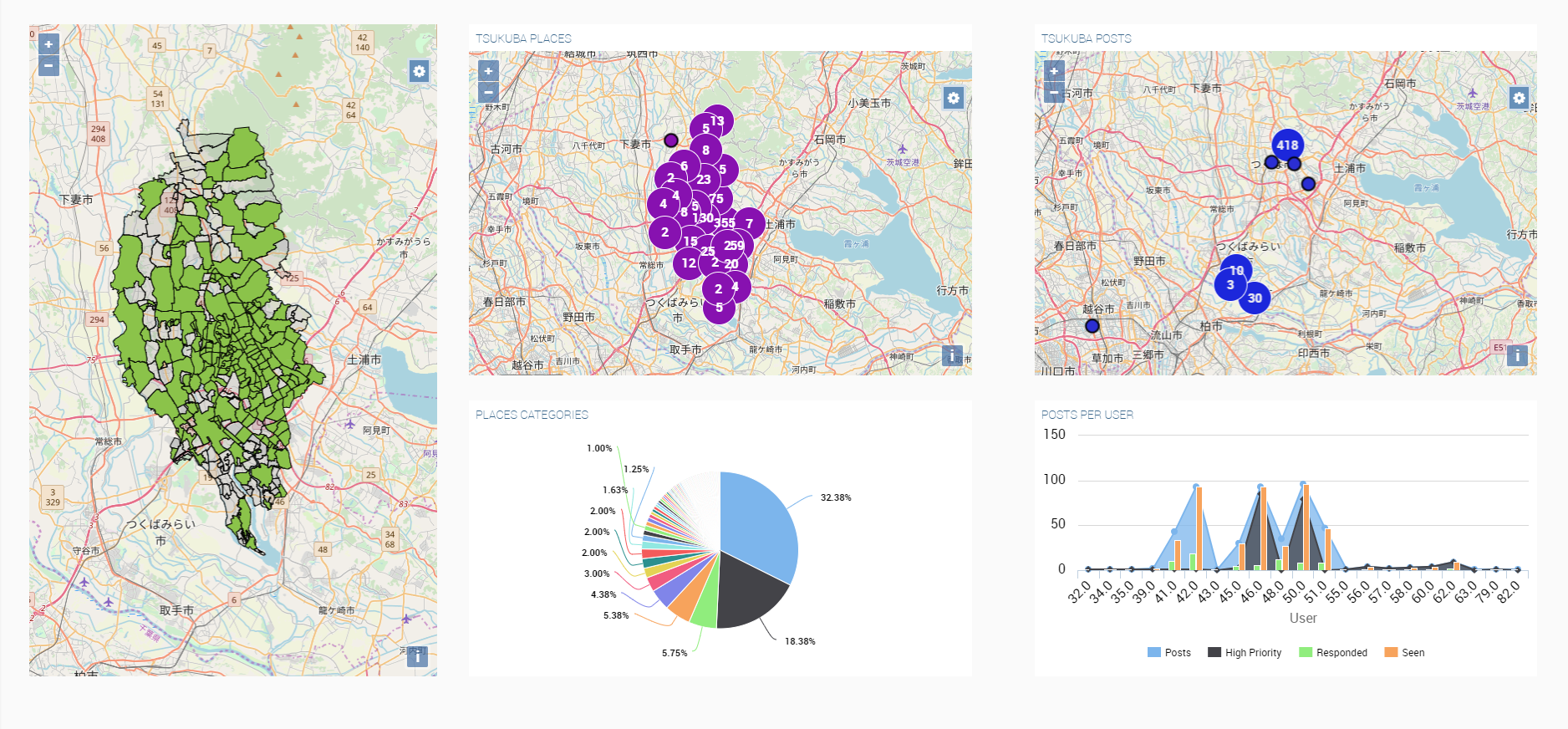
A third example is the dashboard providing insights about reported problems within a city through a dedicated mobile application.
Each widget of this dashboard shows a specific detail obtained by performing different aggregation of available information.
This KNOWAGE’s dashboard aims to support a city for responding to various questions such as, which event attracts more attention, which restaurants are more looked for, which bus stations are the most used, etc. Various visualisation graphs have been provided.
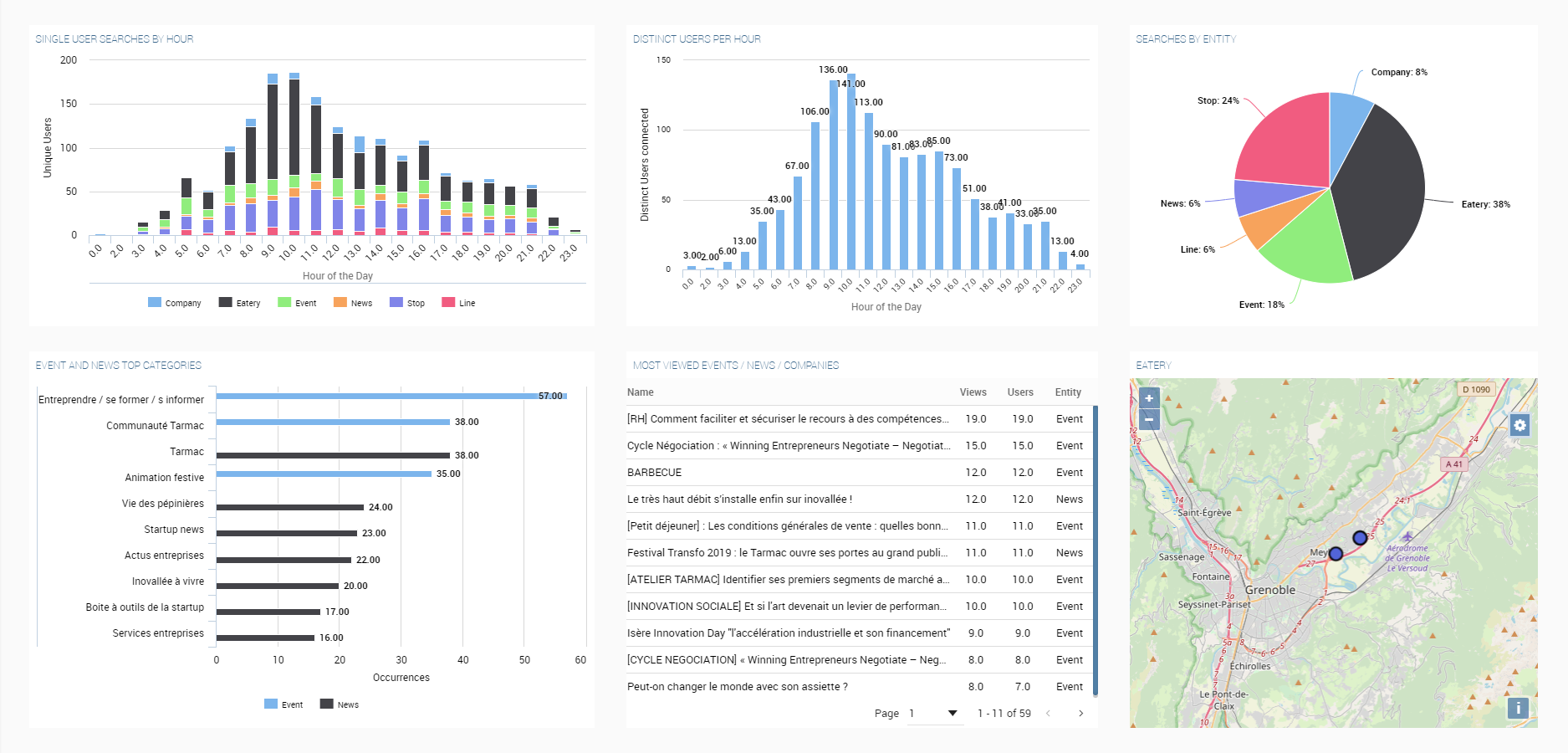
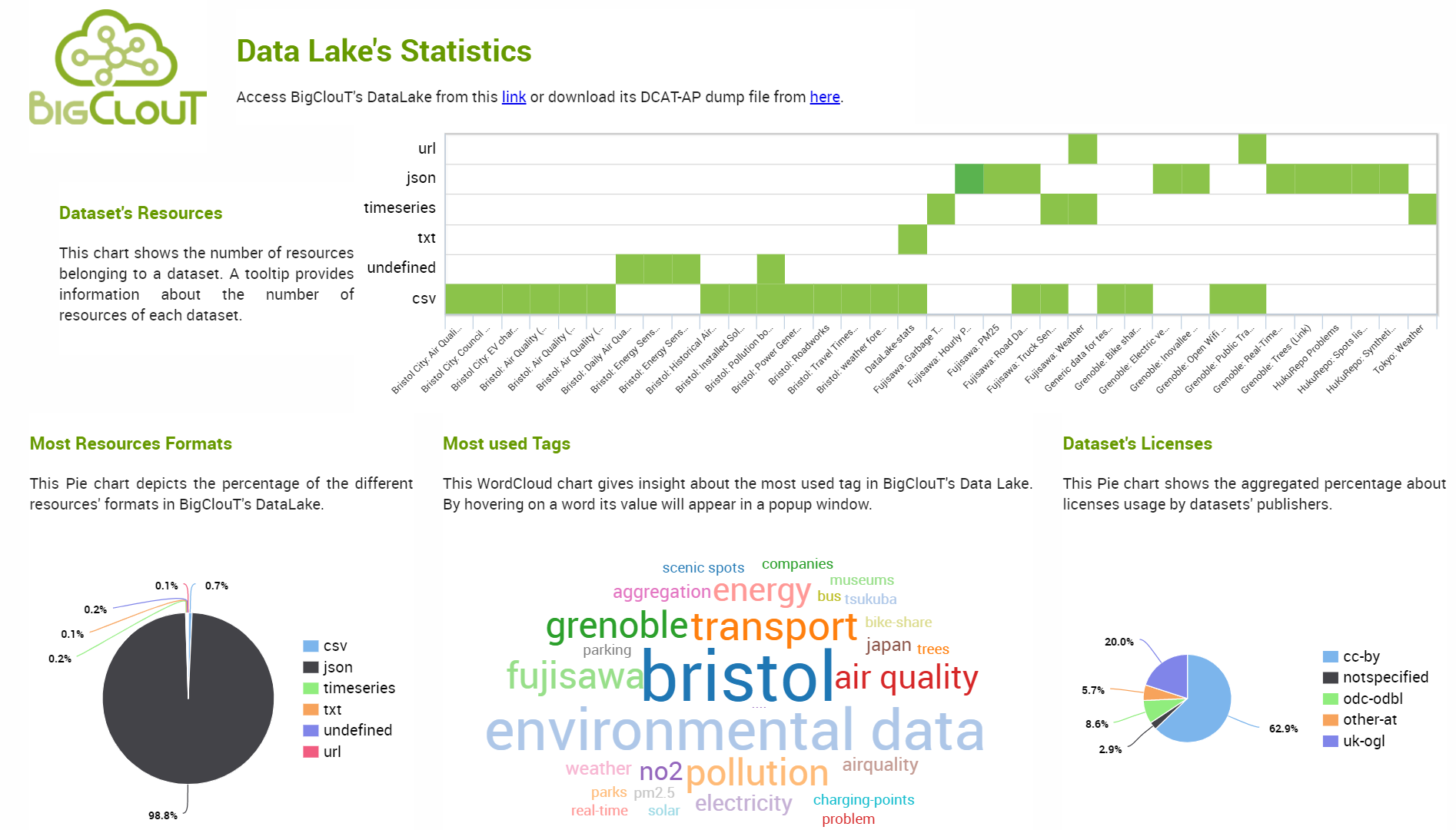
The fourth dashboard provides insights about data hosted in a data lake. KNOWAGE it is also able to retrieve data from the Data Lake by configuring a REST dataset.
Thanks to this integration, all the data in the Data Lake can be analysed and visualized by KNOWAGE.
PILOTS
The main outcome of BigClout project is an integrated smart city platform, deployed and validated in 4 pilot cities within the project targeting applications in several domains such as: Business tourism, Smart transportation and Smart energy management.
Grenoble city area (FRANCE)
Use Case 1: Monitoring of Economic Impact of Events in the city area to provide a better service to visitors, optimize resources in the City and attract more events to the area.
Use Case 2: Monitoring of Industrial Estates to improve the services proposed to users in the different zones, to increase awareness of the services provided in the zones, to optimize public resources (from all stakeholders) and to attract users to the zones.
Tsukuba city area (JAPAN)
Use Case 1: Provide tourism, traffic and environmental information in real time to visitors. Through the smartphone app (HukuRepo) and a digital display at Tsukuba Centre, visitors can check for recommendations.
Use Case 2: Grasp status about foreign visitors to Tsukuba and provide concierge service to them. Foreign visitors using smartphones can submit a problem during their stay in Tsukuba along with a photo and descriptive texts. The system allows volunteers to offer real-time responses in terms of texts.
Fujisawa city area (JAPAN)
Use Case 1: Participatory sensing, and optimizing the incidence on local economy. City officials can record incidents such as graffiti, problems with garbage etc, and to initiate action by city officials to resolve the issues.
Use Case 2: Fine-grained city infrastructure management. Sensors attached to garbage trucks in Fujisawa city enable fine-grained city infrastructure management. In the next roadmap, camera data will allow to determine road surface condition.
Bristol city area (UNITED KINGDOM)
Use Case 1: Predicting mobility patterns of citizens in the city context. Mobility data are aggregated with air quality data in the city, provisioning walking pedestrians with optimized routes in the city center avoiding heavily congested and polluted routes.
Use Case 2: Predictive analysis of users’ power consumption. Predictive analysis on the power consumption make householders aware about different phenomena, for example the electricity consumed by electronic and electrical appliances while they are switched off or in a standby mode.
